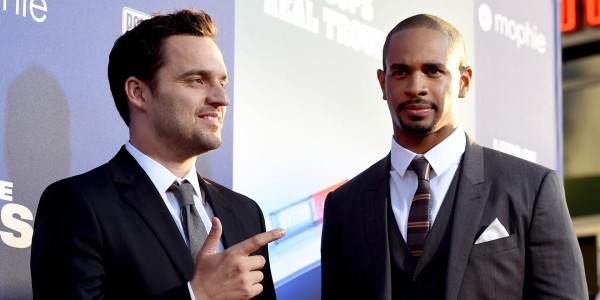The lights are dim, baby. The star power that is Julia Roberts doesn't shine as bright on Broadway as it does on the big screen.
The difference is noticeably visible on the stage of the Bernard B. Jacobs Theatre, where Roberts opened Wednesday in a lopsided revival of Richard Greenberg's "Three Days of Rain."
Roberts, who co-stars with Paul Rudd and Bradley Cooper, gives a small, modest performance that throws off the delicate equilibrium of Greenberg's thoughtful, carefully calibrated play, a two-generational love triangle.
The personality — appealing, vulnerable and sometimes quirky — that often defines Roberts in film is missing here. In "Rain," she delivers cautious, bland portraits of two women: a reserved, emotionally controlled daughter in the first act and the woman's spirited, high-strung mother, 35 years earlier, in the second.
Greenberg's play, first seen nearly 10 years ago at California's South Coast Rep and then off-Broadway at Manhattan Theatre Club, juggles a lot of themes, although it deals mainly with the relationships between children and their parents.
Act 1 takes place in 1995 in a long-empty downtown loft where Walker and his sister, Nan, are meeting good friend Pip. The threesome are the children of two famous architects, both dead. What's brought them together is the reading of a will, a document guaranteed to bring out tensions in the best of people. And, of course, there is a surprise once that task is completed.
Greenberg, author of the Tony-winning "Take Me Out," has created a parade of vibrant characters, and both Rudd and Cooper make the most of them, particularly in the exposition-heavy first act. Rudd portrays Walker, a precocious, sexually ambiguous man, given to impulse and more than a little anger about his cold, distant father. He's a likable actor, even when playing cranky, talkative and sardonic, which pretty much defines his role.
Slideshow 26 photos
Celebrity Sightings
Pip, the son of the second architect, is one of Greenberg's most genial creations. A soap-opera actor, he thrives on the realization that he is not special. Pip is an ordinary man and proud of it. Cooper portrays him with disarming intensity and clearly wins the sweepstakes as the audience's onstage favorite.
Which brings us to Roberts, who in Act 1 has to play reactive to the emotional declarations of her two co-stars. It's difficult to pull off, although Patricia Clarkson, who originated the role of Nan a decade ago, knew how to make the part's minimalist responses define her character. Roberts hasn't developed those nuances yet.
It's Walker who discovers his father's journal in the loft and from it hopes to learn more about his parents. But the diary's entries are cryptic to say the least, particularly its first jottings: "April 3 to April 5, three days of rain."
The second act takes us back to 1960 to those rainy days, and what actually happened.
It's a tantalizing way to link parent and child and lets the actors display their skills at playing a second set of characters. The two architects are shown just before they become famous, talent waiting to bud. And there is the woman, eventually the mother of Walker and Nan, who marries one of them.
Roberts' portrayal of the mother — flighty, volatile and edging into alcoholism (the woman is described by her son as "Zelda Fitzgerald's less stable sister") — is hampered by surface mannerisms, particularly a shaky Southern accent.
But Rudd gets to show another side of talent, with his portrait of a gentle, stammering man, much different from what his son, Walker, remembers. And Cooper captures Pip's intense, insecure father with ease.
Watching what they are and how their children perceive them years later is one of the joys of "Three Days of Rain." Greenberg's play, directed by Joe Mantello, is a lovely celebration of the passage of time — how the present tries to make sense of the past, usually by misconstruing it.
And, yes, rain does fall on designer Santo Loquasto's set, ghostly and debris-strewn in Act 1 and filled with bright promise after intermission. After all, this is a memory play told in reverse, when the consequences of what came before already are sadly known.
It's a much more memorable image than Roberts' Broadway debut.
